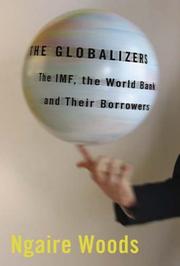| Listing 1 - 2 of 2 |
Sort by
|
Book
ISBN: 145186499X 1462309437 1451909527 9786613829986 145274307X 1283517531 Year: 2006 Publisher: Washington, D.C. : International Monetary Fund,
Abstract | Keywords | Export | Availability | Bookmark
 Loading...
Loading...Choose an application
- Reference Manager
- EndNote
- RefWorks (Direct export to RefWorks)
The main objective of this paper is to quantify the relationship between the global economic environment and the number of Stand-By Arrangements (SBAs). The results suggest that oil prices, world interest rates, and the global business cycle are the most influential indicators that affect the number of SBAs being requested. In addition, the empirical model seems to have reasonable accuracy when predicting SBAs. Furthermore, when oil prices, interest rates, and the global business cycle are adversely shocked by one standard deviation, the conditional probability of a SBA nearly doubles, implying an increase from about six to 12 SBAs. More critically, the model suggests that even a steady deterioration of the global economic climate would imply increasingly harsher conditions for developing and emerging market countries which may in turn significantly increase the demand for IMF resources.
Economic assistance. --- Electronic books. -- local. --- Loans, Foreign. --- Economic aid --- Foreign aid program --- Foreign assistance --- Grants-in-aid, International --- International economic assistance --- International grants-in-aid --- Foreign loans --- International loans --- Loans, International --- Economic policy --- International economic relations --- Conditionality (International relations) --- Loans --- Foreign loan insurance --- Exports and Imports --- Financial Risk Management --- Macroeconomics --- Energy: Demand and Supply --- Prices --- Current Account Adjustment --- Short-term Capital Movements --- Prices, Business Fluctuations, and Cycles: General (includes Measurement and Data) --- Financial Crises --- International economics --- Economic growth --- Economic & financial crises & disasters --- Oil prices --- Business cycles --- Financial crises --- Balance of payments need --- Current account balance --- Balance of payments --- United States

ISBN: 0801444241 9780801444241 0801474205 1322504482 0801456029 9780801474200 0801456010 9780801456022 Year: 2006 Publisher: Ithaca, N.Y. ; London : Cornell University Press,
Abstract | Keywords | Export | Availability | Bookmark
 Loading...
Loading...Choose an application
- Reference Manager
- EndNote
- RefWorks (Direct export to RefWorks)
"The IMF and the World Bank have integrated a large number of countries into the world economy by requiring governments to open up to global trade, investment, and capital. They have not done this out of pure economic zeal. Politics and their own rules and habits explain much of why they have presented globalization as a solution to challenges they have faced in the world economy."-from the IntroductionThe greatest success of the International Monetary Fund and the World Bank has been as globalizers. But at whose cost? Would borrowing countries be better off without the IMF and World Bank? This book takes readers inside these institutions and the governments they work with. Ngaire Woods brilliantly decodes what they do and why they do it, using original research, extensive interviews carried out across many countries and institutions, and scholarship from the fields of economics, law, and politics.The Globalizers focuses on both the political context of IMF and World Bank actions and their impact on the countries in which they intervene. After describing the important debates between U.S. planners and the Allies in the 1944 foundation at Bretton Woods, she analyzes understandings of their missions over the last quarter century. She traces the impact of the Bank and the Fund in the recent economic history of Mexico, of post-Soviet Russia, and in the independent states of Africa. Woods concludes by proposing a range of reforms that would make the World Bank and the IMF more effective, equitable, and just.
Debts, External --- International finance --- Loans, Foreign --- Political aspects. --- International Monetary Fund. --- World Bank. --- Dettes extérieures --- Prêts étrangers --- Finances internationales --- aspects politiques --- Fonds monétaire international. --- Banque internationale pour la reconstruction et le développement. --- International Monetary Fund --- World Bank --- FOREIGN LOANS -- 330.34 --- EXTERNAL DEBTS -- 330.34 --- International monetary system --- International money --- Finance --- International economic relations --- Foreign loans --- International loans --- Loans, International --- Loans --- Conditionality (International relations) --- Foreign loan insurance --- Debts, Foreign --- Debts, International --- External debts --- Foreign debts --- International debts --- Debt --- Investments, Foreign --- Internationaal monetair fonds --- International monetary fund --- aspects politiques. --- Political aspects --- E-books --- Világbank --- Banque internationale pour la reconstruction et le développement --- Mezhdunarodnyĭ bank dli︠a︡ rekonstrukt︠s︡ii i razvitii︠a︡ --- MBRR --- Sekai Ginkō --- Kokusai Fukkō Kaihatsu Ginkō --- Kukche Puhŭng Kaebal Ŭnhaeng --- Segye Ŭnhaeng --- IBRD --- Welt Bank --- Weltbank --- Banque mondiale --- Internationale Bank für Wiederaufbau und Entwicklung --- Banco Internacional de Reconstrucción y Fomento --- Banco Mundial --- B.I.R.D. --- BIRD --- Banca Internațională pentru Reconstrucție și Dezvoltare --- Mirovoĭ Bank --- Svitovyĭ Bank --- Svitovyĭ bank rekonstrukt︠s︡iï i rozvytku --- Verdensbanken --- Międzynarodowy Bank Rozwoju i Odbudowy --- Bank al-Dawlī lil-Inshāʼ wa-al-Taʻmīr --- Bank al-Dawlī --- Världsbanken --- Banca ricostruzione e sviluppo --- Banca di ricostruzione e sviluppo --- BIRF --- I.B.R.D. --- B.I.R.F. --- Shih chieh yin hang --- Shi jie yin hang --- International Bank for Reconstruction and Development --- World Bank Group. World Bank --- Thanākhān Lōk --- Bank Światowy --- Viśva Baiṅka --- Lōka Băṅkuva --- Ngân hàng Thế giới --- Vsemirnyĭ Bank --- Bank Dunia --- Msopʻlio Bankis --- Banca Mondială --- BM --- Prapañca Byāṅku --- Banca mondiale --- Banca internazionale per la ricostruzione e lo sviluppo --- Dhanāgār Bibhab Lok --- البنك الدولي --- بنك الدولي --- 世界銀行 --- 世界银行 --- 国際復興開発銀行 --- Dėlkhiĭn Bank --- Дэлхийн Банк --- Hamashkharhayin Banki --- Svetska Banka --- Wereldbank --- Internationale bank voor herstel en ontwikkeling
| Listing 1 - 2 of 2 |
Sort by
|

 Search
Search Feedback
Feedback About
About Help
Help News
News